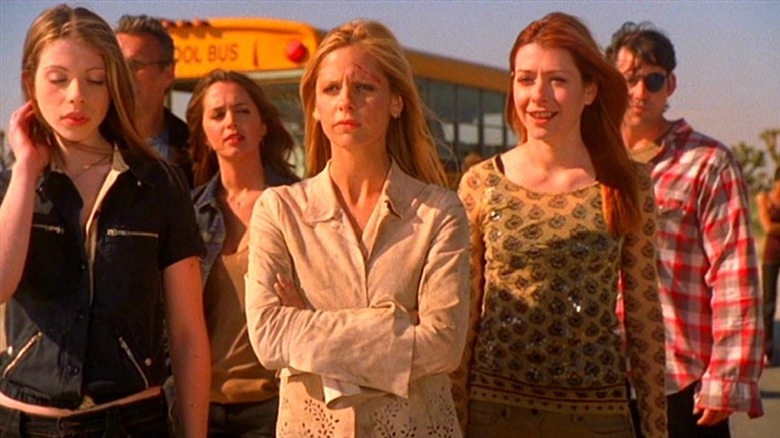
"Buffy the Vampire Slayer" was predicated on the idea of the cute blonde who usually dies at the beginning of horror movies finally having the power to fight back. She may have looked like just another flaxen-haired damsel in distress, but Buffy Summers (Sarah Michelle Gellar) didn't run from the demons in the alley: she annihilated them. In a narrative most commonly reserved for men, Buffy is the one girl in all the world who is capable of saving it.
I remember discovering "Buffy the Vampire Slayer" and falling in love with a TV show for the very first time. It wasn't just about the clever dialogue, monstrous metaphors or unforgettable characters. One of the things that resonated with me the most was that the hero of "Buffy" was a teenage girl, just like me. Sure, she had to bear the weight of her unenviable destiny, but she also had to survive high school. Most of us would agree hell is an apt parallel. While not everything about the show's brand of feminism holds up in 2022 — especially in light of what went on behind the scenes — at the time, there was nothing like it on television.
It seems only fitting that a show as revolutionary as "Buffy the Vampire Slayer" would subvert expectations in its series finale. "Buffy" spent its entire run deconstructing the chosen one trope, before finally shattering it completely with "Chosen." What exactly happened and what does it all mean?
From The Chosen One To Everyone
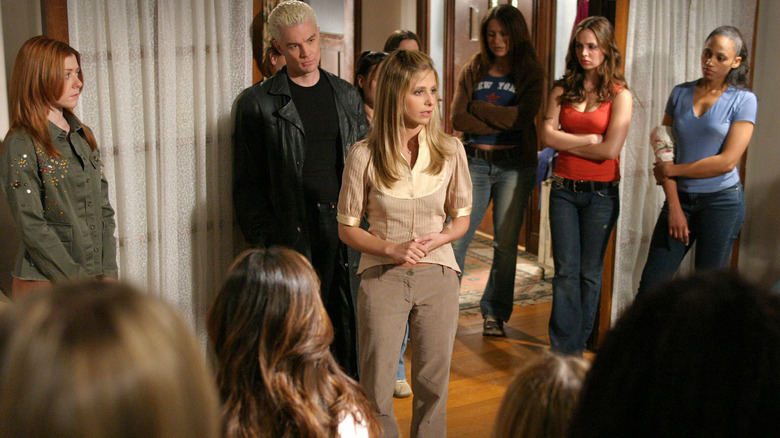
Buffy (Sarah Michelle Gellar) had always been something of a rebel in terms of how she approached her duties as Slayer and fighting this final battle was no exception. Why should there be "one girl in all the world?" When Buffy pulled the sword from the stone (or the scythe from the rock, as the case may be), she reclaimed a part of her power hidden for generations. It's a power she happily chooses to share.
Being the Slayer wasn't Buffy's choice. It was a destiny foisted upon her. It's not just that the gig comes with an early expiration date. It's also how lonely and isolating it is to actually be the Chosen One. Later seasons dealt with this even more, but throughout the series Buffy was forced to make one impossible decision after another, whether it be killing the love of her life, battling her closest friend, or even sacrificing herself to save the world. A few episodes before the finale, when everyone turns on Buffy, Anya (Emma Caulfield) points out that the Slayer is always the one in charge, regardless of the fact that she never earned any of her abilities. Buffy may not have asked for this, but Faith's (Eliza Dushku) journey proves that being granted this power doesn't automatically make you a hero — more on her later.
Much of season 7 focuses on Buffy's flaws, but who wouldn't come apart at the seams under such tremendous pressure? Buffy has never wanted anything more than to just be a normal girl. That's part of what is so beautiful about the finale. Buffy's burden, when shared, becomes a gift. It not only smashes the notion of a Chosen One, allowing all potentials to become slayers in their own right, but metaphorically empowers all girls everywhere.
Buffy Is Cookie Dough
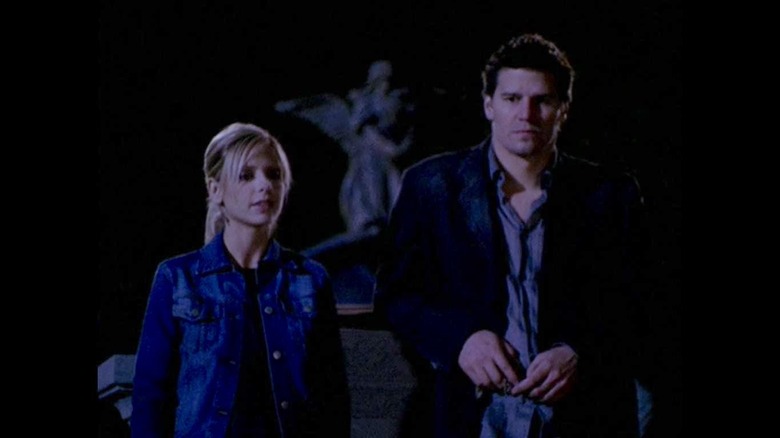
One notable aspect of "Chosen" is the way it handles the show's eternal love triangle, or in this case, kind of doesn't. Since heading to LA for his own spin-off, there had been a handful of Angel (David Boreanaz) sightings on "Buffy the Vampire Slayer," but due to the shows winding up on different networks, Buffy's last meeting with her former beau had taken place offscreen. His return is a delightful cameo, but it's also worth noting that she didn't actually need Angel's help at all -- though the amulet he leaves her with does come in pretty handy.
Buffy gives him her now-famous cookie dough speech, explaining that she's "not done baking." It's an important moment, because although she admits that the recently-ensouled Spike is in her heart, Buffy also acknowledges that she's young and has no concept of what the future holds. She realizes it's okay to not yet know who she is. Buffy doesn't have to have it all figured out and she certainly doesn't need to decide which immortal suitor she's ready to spend her life with at 22. Ultimately, Buffy chooses herself.
Another interesting narrative decision is the ambiguity of Spike (James Marsters) and Buffy's final night before the big battle. They had already made peace over Buffy's kiss with Angel and she had given him the amulet, proving just how much she believes in him. That last night is then a fade to black with no explanation of what happens between them. We know they took solace in each other, but the exact nature of that solace is forever up for debate.
Stories Of Redemption
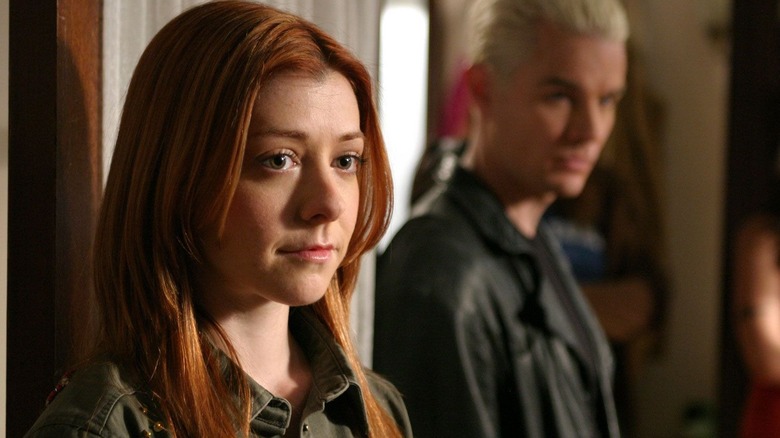
Buffy's grand plan wouldn't been possible without Willow's (Alyson Hannigan) immense power. Season 7 basically abandons the clumsy metaphor of magic as addiction, instead choosing to double down on her abilities. It's understandable, since this rather brilliant gambit needed Willow to be in control, but it still makes for a weird experience when you rewatch the series knowing that she would go from being a magic addict to someone who could use it to save the day. Anyone who struggles with addiction will tell you that's not the way it works.
Metaphor is woven in the very DNA of "Buffy." It's just that most of them are more skillfully constructed. Though heavy-handed, the metaphor kind of works in season 6, but falls apart completely in season 7. I can put that gripe aside, because it's lovely to see Willow fully embrace her power and find a way to reconcile who she once was with who she's become. Plus, the idea is so unexpected, viewers never saw it coming, despite everything we all knew about multiple Slayers existing at once. The Potentials got a lot of fan hate, but it was all building to this.
While we're on the subject of another slayer, Willow, Spike, Anya, and Andrew (Tom Lenk) aren't the only characters who needed to be redeemed by the series finale. After seasons of atoning in prison -- during which everyone but Angel forgot about her -- Faith (Eliza Dushku) also finds absolution. Even her long-standing rivalry with Buffy ends with the two women finally realizing they understand each other on a fundamental level. Buffy losing control to Faith in "Empty Places" is a rough moment, but that experience made them see eye to eye in a way they had never been able to previously.
Spike's Heroic Sacrifice
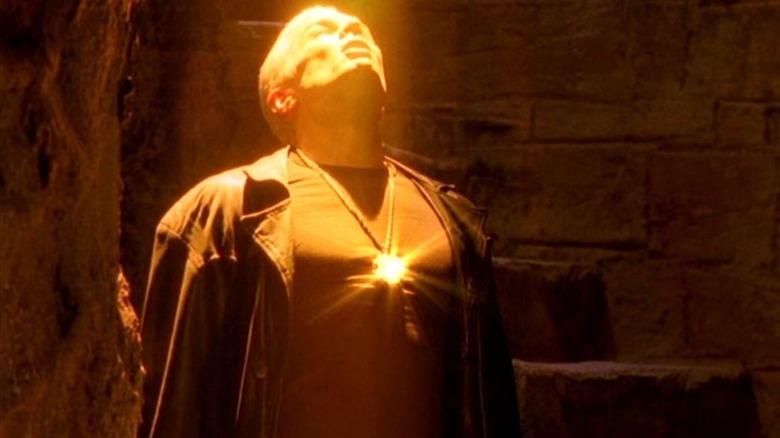
Spike's soul may have been "a bit worse for lack of use," but with the help of the amulet, it was able to wipe out the Turok-Han army and ultimately cause the Hellmouth to collapse in on itself. In his final moments, Buffy told him what he'd longed to hear for years: that she loved him. "No you don't," he replied, "But thanks for saying it." She obviously did love him, even if it wasn't the way he loved her. Buffy's face says as much, but her words comfort him nonetheless.
It took me quite a while to come around to Spike and Buffy, but by season 7 I was a believer, not necessarily that these two belonged together romantically, but that Spike had become someone worthy of Buffy's love, despite the terrible things he did when he was a soulless monster. I completely understand that his redemption didn't land for all "Buffy" fans, but it worked for me. His sacrifice, however, was undermined by the already-made announcement that Marsters would be appearing in "Angel" season 5.
Speaking of "Angel," it's interesting to consider the amulet and its ramifications in the larger context of the Buffyverse. It was given to Angel by Wolfram & Hart, the evil law firm he'd done battle with for years. They likely intended for Angel to wear it, thus taking him off the board until they chose to put him back on. Lindsey later threw a wrench into their gears anyway, and while its unclear exactly what their plans were, the Big Bad isn't giving out such a powerful weapon magnanimously. Perhaps it didn't really matter who wore the amulet anyway. Whether it was Spike or Angel, the First would still be defeated, leaving the world wide open for Wolfram & Hart to continue their own long-brewing apocalypse.
Who Lives, Who Dies, Who Tells Your Story
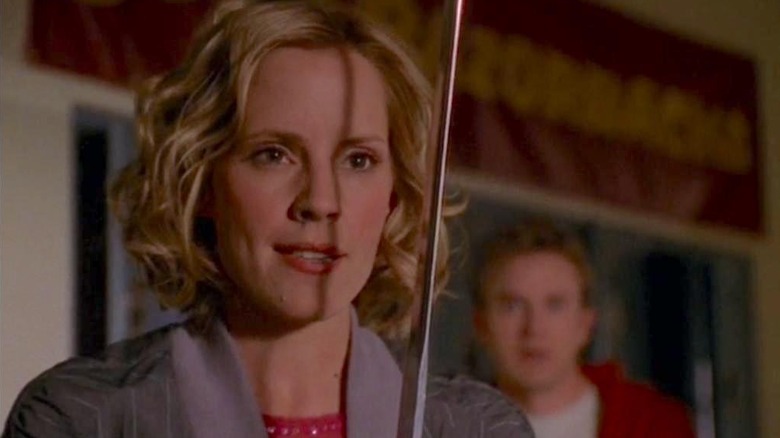
There are a few heartbreaking scenes in "Chosen," but one of the finale's most soul-crushing moments is one that happens so quickly, no one has time to shed a tear: the death of Anya. It was a quick and brutal demise for a beloved character who'd been around since season 3. The former vengeance demon spends her final moments aiding the Scoobies, specifically fighting side by side with Andrew. Her death has always seemed needless, though perhaps that was the point. After all, how many random and seemingly pointless losses of life occur in battle? Andrew does tell Xander (Nicholas Brendon) that Anya lost her life saving his, ending his own arc with one final mythical story, this time to ease someone else's pain -- not that Xander is given the opportunity to have much of a reaction.
Plenty of potentials lose their lives in that final battle, including Amanda (Sarah Hagan), but many others, like Rona (Indigo), Vi (Felicia Day), and Kennedy (Iyari Limon) survive. Whether or not viewers really cared about their lives to begin with is another story. Realizing she could no longer protect Dawn (Michelle Trachtenberg), Buffy had no choice but to let her sister follow her into battle. Dawn was always a controversial figure, but she had grown quite a bit by series end and Buffy really needed her to make it out alive in order for the finale to work. Robin (D.B. Woodside) comes close to death, but surprises Faith — as he promised he would — by being just fine. Too bad that's all the story we get between those two.
'The Earth Is Definitely Doomed'
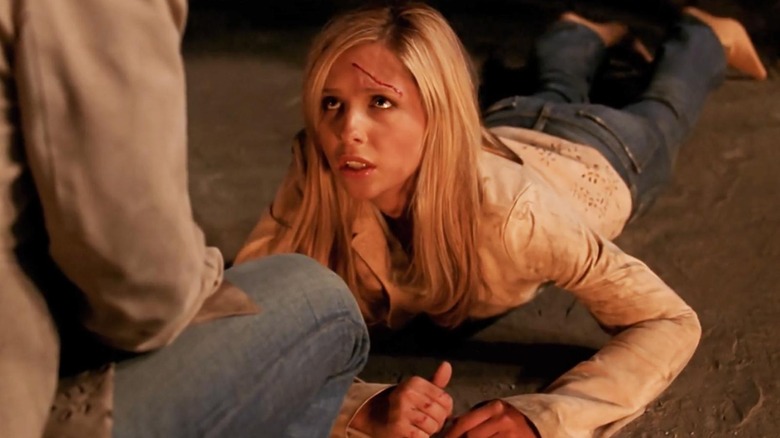
There is also a fun callback to season 1 when Giles (Anthony Stewart Head) says, "The Earth is definitely doomed" in response to the gang's rather cavalier attitude toward the impending apocalypse. One of the most important aspects of "Chosen" is the way it reunites the core four. The focus returns to Buffy, Willow, Xander, and Giles, characters who had always been there for each other, and who, despite their season 7 rough patch, had come back together once again.
Buffy has always wanted nothing more than to be a normal girl without the weight of the world placed firmly on her shoulders. Now that burden isn't hers alone. Buffy is no longer the Chosen One, because that doesn't exist anymore. "Buffy" was populated by many different types of strong female characters, but when the show blew apart its own mythos, it also greatly expanded that definition. We all have the strength within us to slay our own demons, if not literal, than certainly metaphorical. This is a gift Buffy shares with women everywhere, both within the show and to those watching at home. She is perhaps happier at the end of the series than she's ever been.
That final shot of Buffy's smile is that of a woman whose destiny has finally become her own. We may not be getting that "Buffy the Vampire Slayer" reboot, but at least "Chosen" ended the original series on a high note.
Read this next: The 20 Best Female Friendships In TV History, Ranked
The post Buffy the Vampire Slayer Ending Explained: Are You Ready to be Strong? appeared first on /Film.
0 Commentaires